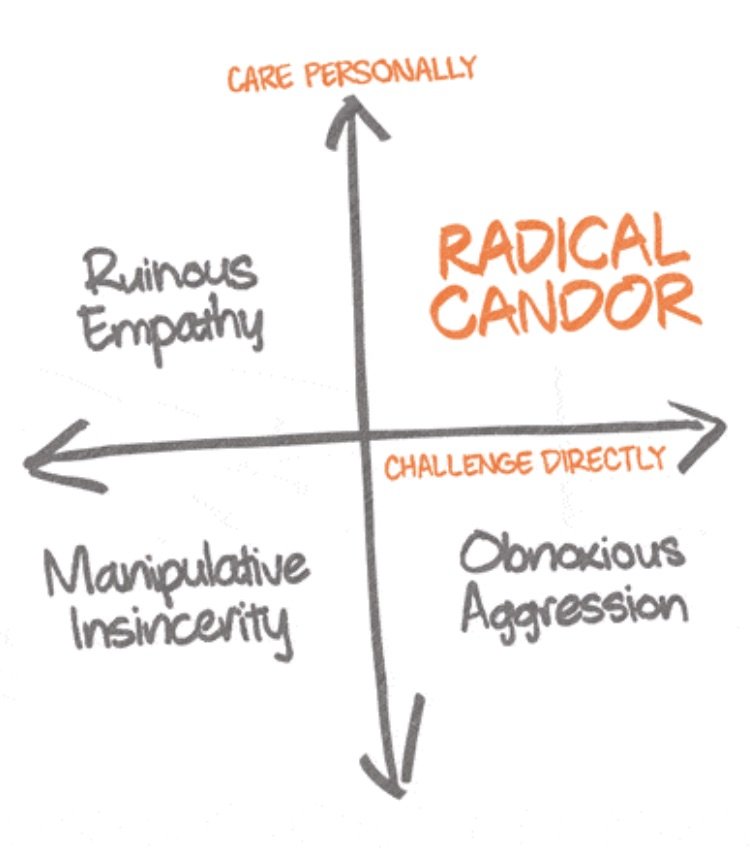A few weeks ago I started to reread Radical Candor by @Kim Scott.
N.B. Please forgive the American spelling of candour throughout this email. The concept originated in America, and it's expressly how it's spelled on and in the book.
I'd read the bulk of Radical Candor a few years ago, but somehow got sidetracked with about 30 pages to go.
The ideas in this book resonated strongly with me. As I read, I realised how relevant the core framework was to my work in Aboriginal employment.
I remember putting together the Macquarie University Indigenous Traineeship Program back in 2003-04, and looking for work areas to host Aboriginal and Torres Strait Islander trainees.
Naturally, I had an EOI set up for interested work units and supervisors to find the right places.
I had a very clear idea in my mind what kind of supervisor I was looking for, but no framework - and barely any language - for what it was.
I knew instinctively, and from my experience as both an Indigenous employment consultant and a working Aboriginal person, what kind of supervision would give the trainees their best chance.
Too often I've seen people who are reasonable, even good, managers change what they do when it comes to Aboriginal staff.
They generally err in one of two ways.
1. They take the view that Aboriginal staff must be molly-coddled, and can't be expected to meet the generally expected workplace standards - before even meeting the candidate.
They decide the Aboriginal staff member must lack confidence - afterall, Aboriginal people generally lack self confidence, right (wrong)? They don't want to do or say anything that might, on the off-chance, upset the new staff member. They're so afraid of upsetting them they don't give any genuine feedback or opportunity to improve. Kim Scott calls this Ruinous Empathy.
I've seen work areas decide to show the trainee only one small section of the role - not nearly a full-time job - until they're 'comfortable', then they'll introduce them to the rest of the job.
Inevitably the trainee becomes bored with such a small range of tasks and, as happens to us all, the job takes much longer to complete to fill up the time allocated - 5 working days.
2. They take the view they must be extra tough on the trainee to make sure they don't step out of line.
They need to provide the the structure and discipline the trainee has lacked in their upbringing. The manager is harsher with the trainee, in some cases yelling to make their point. They monitor them closely at all times, raise every little mistake as though it was a criminal offence. Kim Scott refers to this as Obnoxious Aggression.
This means higher standards, less slack, more condescension, and can lead to push-back from the trainee manifesting in a variety of ways because they can see they are being treated differently to other staff.
In both cases the Aboriginal staff member is unlikely stay very long.
And, in case you think these archetypes are gendered, let me assure you they are not.
But, if these were my only choices - Ruinous Empathetic versus Obnoxious Agressive - I would choose the latter style of manager over the former. Everytime.
Even if they ride out the traineeship, the Ruinous Empathetic manager has not provided them with an opportunity to gain the full breadth of skills and experience, and is often not willing to give a reference or keep them on staff. That's a common story with Aboriginal employment, as anyone in the industry knows.
So many Aboriginal people have been supervised by people who have expressed 'sympathy' for Aboriginal people. And, have left us with a useless qualification without the breadth of experience to back it up.
At least, the Obnoxious Aggressive manager has pushed them to deliver their best work. Perhaps they've re-traumatised the trainee with their brutish behaviour, but an Aboriginal staff member who sticks it out has proven themselves. They may even get a reference from the manager. They are most certainly not likely to stay with the employer, but they are well-armed to do well in most workplaces.
What kind of manager would you want?
What kind of manager are you?
I'd want a manager to err on the side of being honest about their expectations, and my performance.
Of course, I'd still like a manager to genuinely care about both my performance and my well-being. Wouldn't you?
Kim Scott's 'Radically Candid' manager provides a balance between that 'caring personally' and 'challenging directly'.
Her two-by-two framework and accompanying work provide guidance on how to be a better manager.
You can checkout the concept on the official Radical Candor website by clicking here.
https://www.radicalcandor.com/
If you are in a people management role - whether you have Aboriginal staff or not - I'd highly recommend reading Radical Candor.
If you’d like to receive updates from Blakworks, including notifications when a new blog article goes live, complete the form below.

